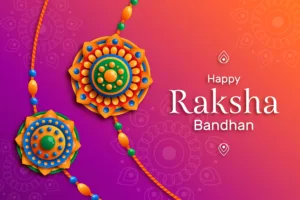Raksha Bandhan an Indian festival is celebrated with great enthusiasm and fervor across the country. Originating from the Sanskrit words “Raksha” (protection) and “Bandhan” (bond) this festival represents the timeless bond of love, protection, and duty between brothers and sisters. Traditionally observed on the full moon day of the Hindu lunar month of Shravan (usually August), Raksha Bandhan transcends regional and cultural boundaries embodying the essence of familial love and social harmony.

Historic and Mythological Roots
Raksha Bandhan’s origins are steeped in mythological and historical legends. One popular mythical story is that of Lord Krishna and Draupadi. According to the Mahabharata, during a great battle, Krishna injured his finger. Draupadi the wife of the Pandavas, tore a piece of her sari to bandage his wound. Touched by her gesture Krishna vowed to protect her, symbolizing the protective promise that a brother makes to his sister.
Another legend is from the time of Emperor Humayun and Queen Karnavati of Mewar. Encountering an invasion from Bahadur Shah, Queen Karnavati sent a rakhi to Humayun seeking his protection. Moved by this act, Humayun immediately sat out with his troops to safeguard her kingdom. These tales whether mythical or historic, emphasize the deep-rooted social value of Raksha Bandhan as a symbol of protection and love.
The Rituals and Celebrations
The routines of Raksha Bandhan are simple yet deeply symbolic. On the day of the festival, sisters prepare a thali (a decorative plate) containing rakhi threads, rice grains, sweets, and a diya (lamp). They perform an aarti (a ritual of worship) for their brothers, apply a tilak (a mark on the forehead) with rice grains, and tie the rakhi around their brothers’ wrists while praying for their well-being and happiness. In return, brothers give gifts and promise to protect their sisters from all harm.
The exchange of gifts often including sweets, clothes, money, or other items, adds a layer of joy and festivity to the occasion. The markets come alive with vivid rakhis, varying from basic threads to elaborated designs studded with beads, stones, and also even precious elements. Sisters living far away send rakhis by post or courier ensuring the bond is celebrated despite physical distance.
Modern-Day Significance
In modern-day times Raksha Bandhan has advanced beyond its traditional bounds. Raksha Bandhan extends beyond biological siblings to include cousins, close friends, and others who share a sibling-like bond. The festival has become an occasion for the celebration of gender equality rights and social solidarity.
In many urban settings, Raksha Bandhan has tackled a wider social importance. Schools, universities, and community organizations where girls tie rakhis to boys as a gesture of communal harmony and respect. This act represents a collective commitment to protecting and supporting each other, regardless of gender or societal roles.
Raksha Bandhan in Different Cultures
In Tamil Nadu, Andhra Pradesh, and Karnataka, Raksha Bandhan is celebrated as Avani Avittam. Brahmin males change their sacred thread (yajnopavita) on this day representing spiritual renewal and the commitment to their duties and responsibilities.
The Evolving Role of Women and the Festival
The traditional narrative of Raksha Bandhan has seen a significant shift with the evolving role of women in society. Today, people view women as equal partners in all aspects of life, not just dependents needing protection. The festival currently additionally represents mutual respect and responsibility. Sisters, also, promise to protect and support their brothers, reflecting the changing dynamics of gender roles.
Conclusion
Raksha Bandhan is one of the most cherished festivals in India a celebration of the long-lasting bond between brothers and sisters. Families come together on this day, enjoy old memories, and create new ones. The festival’s ability to adapt and stay relevant in modern times while retaining its core values of love, protection, and duty speaks to its enduring appeal.
As India continues to modernize Raksha Bandhan stands as a testament to the timeless values that bind us with each other. It is a reminder that in a rapidly changing world, the simple, heartfelt bonds of family and friendships are what truly sustain us.